Lizzie Velasquez shares her inspirational story.
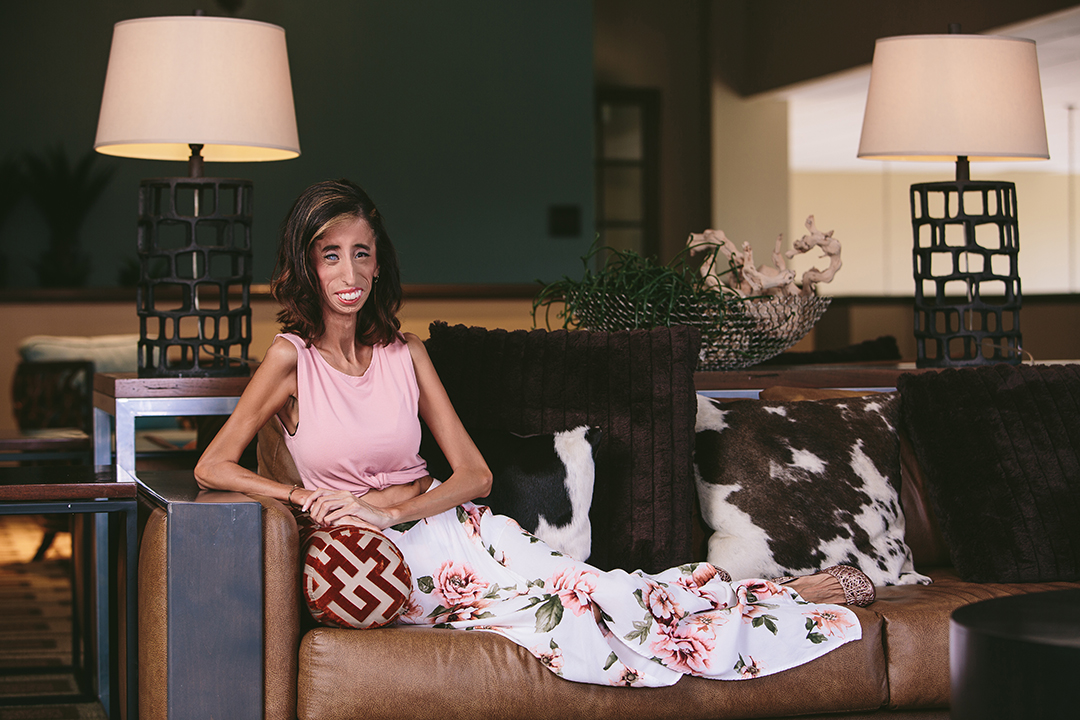 Knock on Lizzie Velasquez’s apartment door in South Austin and the first thing you’re likely to hear isn’t exactly a warm welcome. It’s more like a roar from a rabid beast. But when the door opens, Velasquez is holding a small, white ball of fluff and bluff, all contrite eyes and welcoming, wagging tail. The “beast” is Ollie, a 2-year-old shih tzu-Chihuahua mix, and he’s no bigger than a melon.
Knock on Lizzie Velasquez’s apartment door in South Austin and the first thing you’re likely to hear isn’t exactly a warm welcome. It’s more like a roar from a rabid beast. But when the door opens, Velasquez is holding a small, white ball of fluff and bluff, all contrite eyes and welcoming, wagging tail. The “beast” is Ollie, a 2-year-old shih tzu-Chihuahua mix, and he’s no bigger than a melon.
“Ollie, behave,” Velasquez scolds in a gentle voice, and he immediately obeys.
After a few discretionary sniffs, Ollie grants admission to his domain.
“He’s the best,” she says, sitting him down on the couch. “He doesn’t allow you to feel sorry for yourself and gives you someone to take care of.”
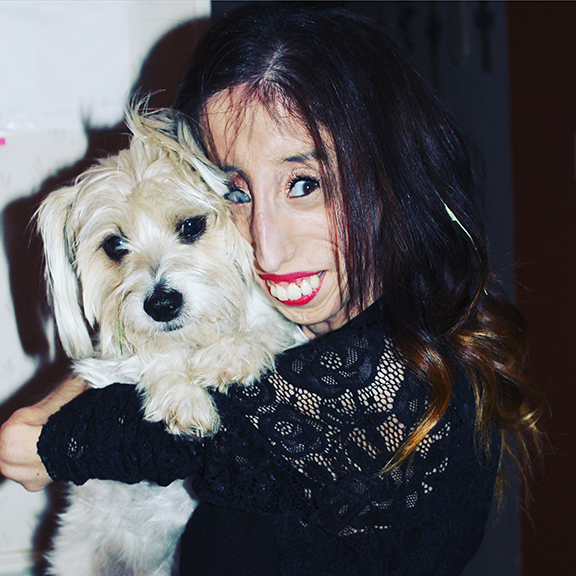 Velasquez offers a rope toy, one of several Ollie-ready distractions she keeps handy.
Velasquez offers a rope toy, one of several Ollie-ready distractions she keeps handy.
“He’s hyper right now,” she says. “In 10 minutes, he’ll be falling asleep.”
Sure enough, after a spirited but brief game of tug rope, Ollie settles into a light slumber, snoring contentedly next to Velasquez’s lap.
“Two months after I got him last year, I did a spread for People Magazine, and he got to be in the photo shoot with me. He’s starting to get recognized,” Velasquez says as she glances down at her snoozing guardian, gently caresses his ears, and whispers, “You have no idea what you got yourself into coming into my life, little boy.”
Tiny but tough, Ollie is fiercely protective of his family, and Velasquez is family. People, too, have a tendency to be protective of Velasquez, but the truth is she’s more than capable of taking care of herself, and she’s living the life that proves it.
Elizabeth “Lizzie” Velasquez fought her way into the world 27 years ago and has been tenaciously overcoming the odds ever since.
On the afternoon of March 13, 1989, six weeks before her due date, first-time mother Rita Velasquez went to her obstetrician and discovered her yet unborn baby girl had stopped growing. Doctors had no options other than an emergency C-section.
“When I came out, they were shocked that I was still alive because there was no amniotic fluid around me at all,” Velasquez says. “So, it was an insane miracle that I came out screaming. They were shocked. I weighed 2 pounds, 10 ounces.”
The doctors had never encountered a case like Velasquez’s before. Her syndrome was a mystery, seemingly unprecedented in the medical archives.
“They didn’t have any medical records to look back and say, ‘This child was born like that so this is what’s going to happen. Here’s what to prepare for,’ ” she says. “Instead, they sort of looked at me and said, ‘Well, she’s so small, she’s not going to be able to do anything in her whole life.’ ”
The specialists prepared her parents for the worst.
“But with all the tests you get when you’re born,” Velasquez says, “everything came back completely normal. There was nothing wrong except I was very, very small.”
Though doctors offered little hope, Velasquez’s parents clung to just that: hope.
“They were like, ‘She’s our daughter. We love her and we’re going to take her home,’ ” Velasquez says. “ ‘Just like any other first-time parents, we’re just going to do our best and raise her with love.’ And that’s what they did.
“My dad told me I fit in his hand, I was so tiny. Even the preemie clothes for tiny, tiny babies were way too big, so they had to go to Toys R Us and get doll clothes to put on me,” Velasquez says, pausing for a moment to laugh. “I feel like I was doing them a favor. I was saving them money because when I was like 2, I started using my baby clothes as my doll clothes because they were the same size.”
Today, Velasquez stands at 5 feet 2 inches, weighs 65 pounds and has done more than survive; she’s thrived.
Until recently, there was no real consensus as to what Velasquez’s uniquely rare syndrome is. It was only last year that doctors finally managed to diagnose her condition as a rare confluence of maladies: She has Marfan syndrome (a connective-tissue disorder) and lipodystrophy, which prevents weight gain. In brief, she’s unable to put on weight, no matter how much she eats. (Throughout her adult life, she has never exceeded 67 pounds.) She’s also been blind in her right eye since she was 4, has impaired vision in her left and has numerous recurring afflictions. Her bones, teeth, heart and other organs are normal.
With Velasquez’s birth came adjustments to her family’s household. While her father, Lupe, worked as a teacher at the nearby elementary school, her mother began babysitting in the family’s home, an ingenious way of assimilating her new- born daughter into the company of other children her own age in a safe, secure environment.
“I never felt alone as a kid,” Velasquez says. “That’s all I knew, being around other kids my age. Mom did activities with us. She had toys, and we would water- color or be outside or listening to music. We were always doing things. We were never a wealthy family growing up, but I never felt poor, if that makes sense. I don’t think I could have ever had a better childhood.”
When Velasquez was 6, her mother gave birth to another girl, Marina.
“I remember taking her to show-and-tell in kindergarten,” Velasquez says. “She was just a few months old. I was like, ‘Look at my sister, who’s a baby, and she’s half my size already!’ ”
A baby brother, Christopher, followed three years later. Velasquez’s siblings received the same attention and love she did.
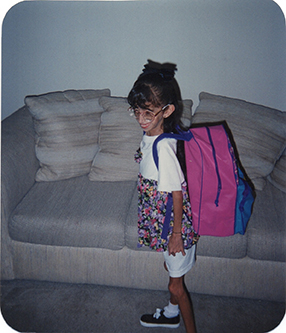 “My parents did an amazing job at making sure my brother, sister and I all felt important,” says Marina Velasquez, now 21 and a senior at Texas State University. “Everything we did, we did as a family. Of course, the three of us had the normal arguments, but what siblings don’t fight over what shows to watch or who ate the last slice of pizza?”
“My parents did an amazing job at making sure my brother, sister and I all felt important,” says Marina Velasquez, now 21 and a senior at Texas State University. “Everything we did, we did as a family. Of course, the three of us had the normal arguments, but what siblings don’t fight over what shows to watch or who ate the last slice of pizza?”
When it came time for her to begin public school, Velasquez’s parents decided that, just like any other child, she’d be there for the first day of classes. A photo taken on that long-ago morning reveals a small, bespectacled girl with a fearless smile proudly sporting a new school back- pack nearly twice her size, eager to conquer the world.
The world Velasquez set out to conquer was about to change in a big way.
“That’s when I realized I was different, for the first time ever. I had no clue,” Velasquez says. “I couldn’t tell that I [didn’t] look like the other kids until I started school, and that was because of them being afraid of me and calling me names and all that stuff.”
She would approach potential playmates and introduce herself, only to be met with gasps or worse. Sometimes, the other kids ran away. At first, Velasquez was perplexed, hurt and embarrassed. While other children shunned her, many adults either recoiled or became overly empathetic. And kids, being kids, could be cruel to the new student. It was the first time in her life Velasquez experienced bullying, but it would not be the last.
Fortunately, her father was a teacher at Velasquez’s elementary school and kept a watchful eye on his daughter.
“He has this way of making you feel at ease,” Velasquez says. “If he would be walking in the hallway and [see]me in my class, he would do a cartwheel in front of my class to make everyone laugh. He knew I felt different. So, to take the attention off me, he’d do something silly to help me. It was cool having my dad there, but once I got older, it was like, ‘Oh my God, he’s embarrassing me.’ ”
Eventually, Velasquez’s pain and confusion about being ostracized by others began to morph into something else: anger.
“The anger didn’t really start until I was like in 1st or 2nd grade because that’s when I actually started to understand what was going on, and realizing that I couldn’t say a night- time prayer or blow out a birthday candle and make a wish that I would wake up and look like everybody else,” she says. “And for that, I was angry.”
Somehow, she managed to soldier on.
“I kept it all suppressed, always, for many years. For as long as I could remember, I would only cry if I was going to bed or if I was taking a bath because I knew nobody would be coming in,” Velasquez says. “I didn’t want my parents to know I was upset. I felt like I’d be letting them down, which is crazy. I don’t know why I felt that.”
As time passed, she learned to channel her anger into something far more productive: resilience.
“I just didn’t talk about it until like the 4th or 5th grade,” she says. “I always had friends, and they would always stick up for me. If we were in the cafeteria and kids at the other tables were saying something about me, they never fought back by being mean. It was always them just introducing me to whoever it was saying something about me. And I never told them, ‘Please don’t be mean.’ It was just what they did.”
By the time Velasquez began high school, things were starting to improve.
“I think my personality of determination and stubbornness really started making itself very apparent at that time,” she reflects. “I feel like I’ve always been a very self-aware person. Once I got older, [I realized], ‘This is your life. Sometimes, it sucks, but you can make it not suck. You just need to figure out how to make it not suck.’ I got the bright idea to join organizations and make friends and put myself out there versus feeling like I needed to hide so I could avoid people, to not feel like I was different.”
During her freshman year at Crockett High School, after deciding she wanted to try out to be a cheerleader, Velasquez surprised even herself when she made the team.
“I made it,” she says, a ripple of wonder still in her voice. “I found out later I made it because everybody made it, but I was like, ‘I don’t care! I still made it!’ I practiced my butt off, I did it and I loved it. I had to have all my uniforms altered; all my stuff was so tiny. I was the girl they threw up in the air. I remember I once fell at practice. I was pretty high up, and the other girls just freaked out. I just got back up and said, ‘Let’s try it again.’ And they looked at me for a few seconds. ‘Are you broken? Are you OK?’ I’m like, ‘I’m little, but I’m tough. I’m fine. Let’s try it again.’ ”
The assumption that Velasquez is fragile is a misconception she’s quick to remedy, often with humor.
“Sometimes, if I’m not in the greatest mood and someone’s being extra gentle with me, it’s fun to play with them and act like they hurt me, just to see their reaction,” she says with a mischievous twinkle in her eye.
Things were good for that first year at Crockett High. Velasquez had friends, family, support and good weather. Then the tsunami hit.
It was her sophomore year and she was 17. While casually clicking random links looking for Taylor Swift music on YouTube, she accidentally stumbled across a short video titled The Ugliest Woman in the World, and found a strangely familiar face: her own. Eight seconds long, no sound, 4 million views and thousands of comments:
“Why did your parents keep you?”
“Set it on fire!”
“Do yourself a favor and kill yourself.”
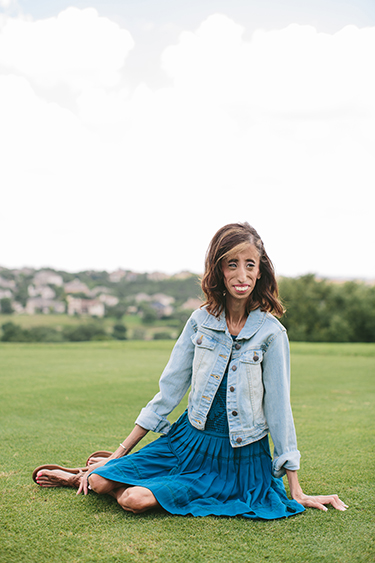 And the hits just kept coming, each more hurtful than the last. It was a devastating introduction to the dark side of social media and the odious sickness called cyber-bullying. Velasquez was an easy target.
And the hits just kept coming, each more hurtful than the last. It was a devastating introduction to the dark side of social media and the odious sickness called cyber-bullying. Velasquez was an easy target.
“I’d worked so hard to build my confidence up and then, within five seconds, it was just gone,” Velasquez remembers, pausing and reaching for a bottle of water. Her throat still tightens at the recollection. “I was reading all the comments and started letting their words become me. I started thinking, ‘Are they right? Would the world be better if I just took myself out of it?’ ”
For days, she wouldn’t talk to anyone—her parents, her siblings, her friends. Finally, she had an epiphany.
“I told myself, ‘I can either let their words become my definition of me, or I can create my own definition the way I want it to be.’ That was my choice,” she says. “I didn’t know how I was going to do that. I just knew I was determined to do that.”
An old Theosophist proverb says, “When the student is ready, the teacher will appear.” In this case, the teacher was Velasquez’s insightful vice principal, Christine Kent. About a year after the Ugliest Woman video went viral, Kent reached out to Velasquez with a proposition. There was to be a test day for 400 9th graders in the auditorium. Would Velasquez mind telling them her story? Velasquez’s first response was immediate.
“I said, ‘No way. You’re insane. Why would I do that?’ She told me to think about it and talk to my family. I did, and they thought it was a great idea,” Velasquez says.
Eventually, Velasquez was persuaded. Meticulously typing out every word of a speech, she dutifully put it in a folder, went onstage and peered out into a sea of faces, both familiar and frightening.
“I was so scared, especially because all the teachers were like, ‘We’re going to be here. They usually get loud. We’ll quiet them down.’ So, I started reading. I didn’t look up,” she remembers.
But instead of hearing the anticipated jeers and murmurs, she became aware of a respectful, spellbound silence. Halfway through, she looked up, put her folder down and just started talking.
“I felt so confident and comfortable,” she says. “I felt, ‘I belong here.’ At the end, these tough kids were coming up to me and hugging me and crying and thanking me. I realized those people I was talking to, they don’t know what it’s like to be in my shoes, but we can connect in other ways. They know what it’s like to not be confident in themselves. They know what it’s like to be bullied. They know what it’s like to want to have friends. So, on that note, I can relate. So, I just went with it, and it was amazing.”
It was the defining moment in Velasquez’s young life, exhilarating and empowering. She went home and during the course of the next few hours, she had Googled “How to be a motivational speaker,” built a rudimentary website, created a new email account and began compulsively watching YouTube videos of motivational speakers. Next, she began emailing churches and organizations, pitching her services as a motivational speaker and offering to speak for free.
“They had no clue that I’d literally done just one speech that day,” she recalls with a smile.
A social-media addict, Velasquez began posting self-made video blogs that quickly went viral, chatting about the same seemingly mundane stuff that preoccupies many teenage girls: her new iPhone case, her daily makeup routine, boys. She also started chronicling her increasingly high-profile travels and speaking engagements, ironically utilizing the same social media that had almost destroyed her to rebuild herself. In 2010, working with her mother, she also wrote Lizzie Beautiful: The Lizzie Velasquez Story, a book that was equal parts memoir, motivational anecdotes and advice for young readers. She went on to publish two follow-ups: Be Beautiful, Be You in 2012 and Choosing Happiness in 2014.
As her speaking engagements increased, Velasquez realized she couldn’t continue to offer her services gratis.
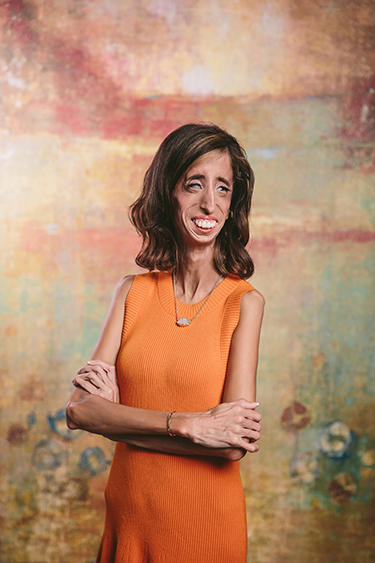 “I realized, ‘I’m sort of an adult now. I need to start paying bills. If I want to do this as a profession, I’m going to have to start charging,’ ” she says.
“I realized, ‘I’m sort of an adult now. I need to start paying bills. If I want to do this as a profession, I’m going to have to start charging,’ ” she says.
A veritable one-woman franchise, she handled everything: bookings, scheduling, makeup, hotel reservations—all while attending school full time. It was a dizzying routine.
By the time Velasquez entered Texas State University in San Marcos, she had resolved to test her independence by moving out of her family home and onto campus, a move met with some resistance from her ever-protective parents.
“My dad actually offered to pay me to stay home and go to school in Austin,” she says. “I was like, ‘No, sir. Sorry. I need to be independent and learn how to live life on my own.’ So, I did. I moved away and I loved it. I just really became my own person for the first time. It was one of the best decisions I ever made.”
While most media coverage in the wake of Ugliest Woman was supportive of Velasquez, occasional exploitative and hurtful press surfaced. Following a lengthy phone interview with a writer in the U.K. in 2010, Velasquez was shocked to see her story reduced to a sordid headline: “Girl has to eat every 15 minutes or she’ll die.” Once again, Velasquez had found herself the unwilling center of attention for the wrong reasons, this time on an international scale. There was a feeding frenzy of calls and emails from hungry media eager to follow up.
“I was frustrated because they all wanted to talk to me about a lie,” she recalls, still indignant, still exasperated.
One number kept calling, and it just kept saying, “NBC – Universal.” It was the Today Show offering to fly Velasquez and her family out to New York to appear for an interview.
“I just wanted to get my truth out, and it was the perfect opportunity. So I did,” Velasquez says.
July 28, 2010, with her mom and dad by her side for support, Velasquez went live on national television to share her story. Ever the mindful marketer, she made sure she included a plug for her first book just before the commercial break.
Velasquez evolved from local hero to national celebrity. One person whose attention she caught was producer Sara Hirsh Bordo, who was putting together the first TEDxWomen event in Austin.
“They were looking for local people who were taking a stand against bullying, and had heard my story,” Velasquez says.
Bordo immediately recognized motivational gold when she saw it, inviting Velasquez to be a speaker at the event.
Dec. 5, 2013, just weeks after graduating college with a degree in communications, Velasquez strode onto the stage at Austin Music Hall, working the crowd with the seasoned finesse of a veteran, drawing laughter, tears and a thundering ovation. Velasquez’s appearance and 13-minute speech, “How do you define yourself?” went viral overnight. It has since become the most widely viewed speech in TEDxWomen history, seen by more than 10 million viewers throughout the world.
“I actually made that talk up as I was going,” Velasquez remembers. “I just told myself I was going to speak from my heart. Afterwards, I was like, ‘That was fun,’ and I went home and put pajamas on, ordered Chinese food and it was like, ‘OK, it’s break time.’ Then we posted it online and it went viral really quickly. And then everything—everything—changed after that.”
Bordo saw more than potential in Velasquez; she saw a mission in the making and became driven to produce a documentary on Velasquez’s life and experiences. After conferring with Velasquez and her family, Bordo launched a Kickstarter campaign, The Lizzie Project, raising funds to produce the movie, eventually titled A Brave Heart: The Lizzie Velasquez Story.
“I had never directed or produced a film, but my intentions to help her rise as a hopeful voice were authentic,” Bordo recalls. “After Lizzie and her family agreed, we built and launched our Kickstarter campaign in less than 30 days to coincide with Lizzie’s appearance on The View. I put up the first portion of the production from my savings. The production dollars came out of our successful Kickstarter campaign, and the post-production dollars came from private donors from across the country, with many of them being so many Austin angels.”
While filming the documentary, Velasquez journeyed to Washington, D.C., to lobby for the Safe Schools Improvement Act, which would require schools to create policies and safeguards against bullying, a subject on which she was an authority. It was a demanding trip.
“We had been traveling for over a week internationally and then domestically,” Bordo says. “She was completely exhausted, was becoming sick and refused to cancel any meetings. We pushed her in a wheelchair while she gave a briefing, pitched members of Congress, took photos with fans and was sick in and out of the bathroom. She put a smile on her face, a mint in her mouth and kept moving hour by hour. She knows she is here for a reason larger than herself. It isn’t lost on her for a second, and she continues to rise time after time.”
Two years after Bordo pitched the idea of a documentary, A Brave Heart had its world premiere in Velasquez’s hometown at South By Southwest March 14, 2015, one day after Velasquez’s 26th birthday.
“The entire weekend felt like a dream,” Velasquez remembers.
The movie went into general release in September.
As time passed, the TV appearances and interviews became a blur. Ask her about the countless shows she’s appeared on and Velasquez draws a blank.
“Oh, man, I don’t even know the names of them,” she says. “There were a lot coming from other countries.”
Velasquez became a worldwide spokesperson against bullying, journeying to exotic and faraway countries, selfie stick always in tow for posting to her chatty blogs.
Her fame, however, has its downside. Well-intentioned people can inadvertently overwhelm and drain her. Some even regard Velasquez as a sort of petite messiah and are anxious to draw strength from her healing touch.
“Sometimes, they want to just wrap around me or hold me or kiss my cheeks,” she says. “I appreciate that I’m that person for them, I really do. But at the same time, I cannot be that person for so many people over and over. I’m just one person. … It’s not only when I’m giving speeches. I can be walking through an airport or just shopping and someone can come up to me. I could be having this really great day and suddenly, they’ll tell me this really heavy story…and then, when I walk away, I’m like, ‘What?’ ”
She instinctively turns to Ollie, now rolling over and half awake, and holds him close.
Right now, Velasquez is in a good place, catching up on some much- needed downtime. Two years ago, she moved into her own apartment, a stone’s throw from the home she grew up in. But she was seldom there, and when she was, she wasn’t alone.
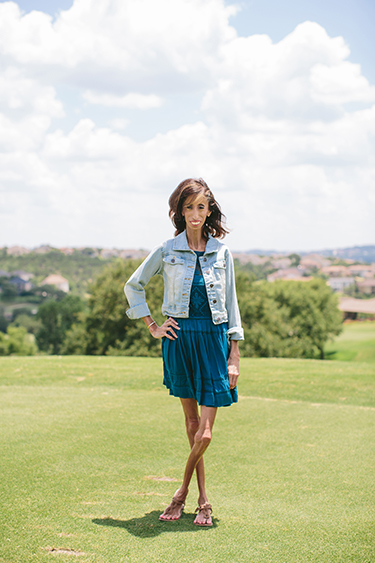 “I got my keys two weeks after we started filming the documentary. So, I was never really alone for about eight months because the crew was here, other people were here. So, I didn’t actually live on my own until a year later. … I was sort of burnt out. I was tired of myself,” she admits, with an audible sigh.
“I got my keys two weeks after we started filming the documentary. So, I was never really alone for about eight months because the crew was here, other people were here. So, I didn’t actually live on my own until a year later. … I was sort of burnt out. I was tired of myself,” she admits, with an audible sigh.
This is really the first time she’s had alone time in years.
“It’s been a calm week,” she says, looking down at Ollie, now deep in a doggie dream, legs twitching. “Usually, my schedule is filled with lots of travel for speaking events, and I just submitted the manuscript for my fourth book two weeks ago…so, I’ve been taking it easy since then.”
What does she do to relax?
“Hang out and rest, play with Ollie, spoil him, spend time with my friends, going to have a glass of wine, going to dinner, hanging out. I have the palate of a 5-year-old—macaroni and cheese, pizza, grilled cheese. … I’m the pickiest eater in the entire world. My team now knows that when we go out to eat, we’ve got to make sure there’s a kids’ menu for me,” she laughs. “So, now I’m just taking that time. I feel like I have all the people in place, I have anything I could ever want in place and now it’s up to me to decide what do I want to do next besides the book? And I don’t know.”
She laughs like a little kid trying to decide which candy bar to buy, and repeats, “I don’t know.”
She is currently looking to buy her first home, yet another landmark event in the Velasquez saga.
“I like to know that I have all of my options and that I’ve experienced all that I could, not so much having the experience, but proving to myself that I can do it,” she says. “I’m going to be 28 next year. I’m just like every other girl. I date and I want to meet the man I’m going to marry and see where that road goes. I’m always open to it. But it’s one of the biggest things I’ve been trying to find the balance with, especially over the last year because my life is now so public. My social media is the biggest it’s ever been. With the documentary out, people know me by name. So, I went from being able to keep certain things private to now, where it’s really hard to keep things private. So, I’m trying to find the balance of wanting to find someone who would be OK with both my personal life and my private life because now that’s what I bring to the table.”
But tomorrow will take care of itself with the inevitable nudge from Velasquez herself. Meanwhile, though, it’s Velasquez and Ollie, and both seem to like that arrangement just fine. The only downside is that with Velasquez’s increasingly demanding travel schedule, Ollie is often left in the care of her parents.
But who knows? Once she gets her new house, perhaps she’ll get Ollie a companion and playmate to keep him company. But if she does, the new dog will have to understand one thing: No bullying is allowed in the world of Lizzie Velasquez.


